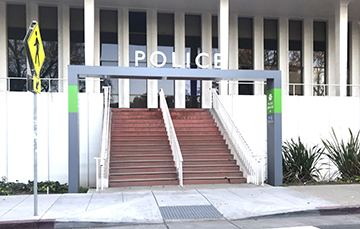
BY BRADEN CARTWRIGHT
Daily Post Staff Writer
The Palo Alto Police Department should put residents on a panel to interview potential new hires, Independent Police Auditor Michael Gennaco recommended in a report to council yesterday.
“Their involvement could provide useful insights and a strong message about the department’s commitment to more integration with the public it serves,” Gennaco said.
The interview panel is currently handled by a lieutenant and a police agent, who ask general questions about the person and how they would handle hypothetical situations.
The recruitment team told Gennaco that they appreciated the concept of including the public on the panel. But they were concerned about being able to do the interviews regularly and on short notice, according to the report. Gennaco said these issues “do not seem insurmountable” if the community representative has the flexibility to be available on short notice.
Chief Andrew Binder wrote a one-page memo responding to Gennoco’s recommendations. The department “will consider opportunities for inclusion of community stakeholder input on potential candidates,” he said.
Council voted in March last year to have Gennaco and his company, OIR Group, write a report on recruitment, in addition to his regular reports that look at uses of force, citizen complaints and internal affairs investigations.
Council will talk about the report, which cost $10,000, on May 8, while the regular report has been delayed.
Gennaco said that police departments across the nation are struggling with recruitment, and Palo Alto is no exception.
More officers are retiring earlier, and the pool of new applicants is considerably smaller than in the past, Gennaco said.
Palo Alto tries to appeal to diverse candidates, but the results are often disappointing, Gennaco said.
For example, a supervisor told Gennaco that he sent out emails to organizations throughout the region that focus on black students, with the hopes of soliciting an invitation to meet with interested members of these groups.
But the outreach failed to produce a response of any kind, Gennaco said.
“Frustratingly, the very tensions that have heightened the need for diversity have been obstacles to attracting large numbers of applicants from underserved communities — thus perpetuating if not exacerbating the problem,” he said.
The city made headlines last year for having no black police officers, but that appears to have changed.
The department doesn’t track demographics of employees, but pictures on social media “suggests that representation of different groups is increasing to an encouraging extent,” Gennaco said.
As for recruiting more women, Gennaco suggested offering a “job share,” with multiple workers in one full-time position.
This would give more flexibility to officers who struggle to balance family commitments with full-time work, Gennaco said.
“While there are undoubtedly practical obstacles to such arrangements, the idea that organizations would entertain new types of accommodation is, in our view, an appropriately progressive evolution,” he said.
One thing that is out of the department’s control is pay, which is determined in bargaining between council and the police union.
Officers make $50 to $65 an hour, which falls in the middle range among neighboring agencies, Gennaco said.
Gennaco went through all of the steps the department goes through to screen an officer.
One officer wasn’t hired after taking a polygraph examination with an outside contractor that showed potential issues with his credibility. The results were ambiguous, but the department decided not to move forward with the candidate, Gennaco said.

gonna take a wild guess and say that PA officers suing over the Black Lives Matter mural didn’t help with recruiting black students to become officers here
The good thing about putting citizens on police oral boards is that the applicants can see for themselves what kind of loons they’ll be encountering on the job.